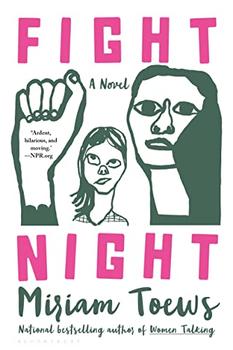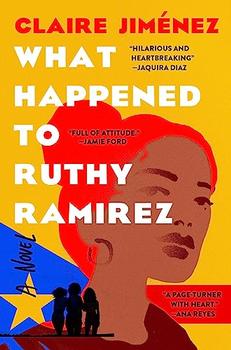Summary | Excerpt | Reading Guide | Reviews | Beyond the book | Read-Alikes | Genres & Themes | Author Bio

Miriam Toews has already established herself as a powerful writer of women-centered narratives, and Fight Night is another incredible work to add to the canon. It's both refreshing and necessary to read a novel in which women are the main characters while men are offstage supporting characters that the women reflect upon to propel their own growth and development.
When the novel begins, it's a difficult time for nine-year-old Swiv, who has been suspended from school and is dealing with an absent father and a depressed mother. Swiv learns why her father left her family through her mother and grandmother, Elvira, and she also comes to understand the changing family dynamics by communicating with her yet-to-be-born baby brother, Gord. Swiv's insightful and youthful first-person narrative is interspersed with the voices of other family members — sometimes in the form of letters, or emotionally charged monologues — as they all speak to one another, including some who are dead or yet to be born. Through these novel methods of communication, the family's tumultuous past gradually unfurls.
Spanning three generations and two continents, one might not immediately recognize the monumental vastness of the themes and truths that Toews is exploring within Fight Night. This is because we are gleefully and gently guided through the events that unfold by Swiv as she tries to make sense of the world. The main thing that stands out is how incredibly funny this novel is — and that's the only way that Toews can draw out such serious and heartbreaking truths about life, by soothing us with humor and the small observations that bring joy and connection. Otherwise, how else can we face the unavoidable realities of life — that people will die, relationships will be lost, and we will inevitably let each other down, no matter how hard we try not to.
It is this balance between levity and gravity that Toews skillfully maintains as she introduces us to Swiv and Elvira, whose relationship embodies the paradoxical contradictions of life. They are young and old, caretaker and cared for. Swiv is precocious and burdened more than she should be for her tender age, and Elvira is old and deteriorating in health, but she frequently behaves with more exuberance and youth than Swiv. The relationship between the two as they embark on a journey from Canada to California to visit family shows how these polarities coexist, even when they are constantly pushing and pulling against each other. Swiv is frequently embarrassed by and frustrated with Elvira, she simultaneously loves and hates her, and she vacillates between feeling oppressed and needing her grandmother's dependence.
As Swiv tries to fight these contrasting realities of her life and her family, Fight Night culminates in a dramatic conclusion that provides deep clarity and meaning. It ties together the hodgepodge of seemingly random events, characters, word associations and references that unfold throughout the novel. This book helps us realize that love is big enough to encompass it all — all of the contradictions, messiness, tragedies and joys in life, spanning from the smallest and bawdiest of jokes to the most significant of events. Ultimately, this is why one lives, why one constantly fights to reconcile, balance, and find meaning — to reach this type of expansive love that transcends generations and the cycles of birth, life and death.
![]() This review was originally published in The BookBrowse Review in October 2021, and has been updated for the
February 2023 edition.
Click here to go to this issue.
This review was originally published in The BookBrowse Review in October 2021, and has been updated for the
February 2023 edition.
Click here to go to this issue.

If you liked Fight Night, try these:

by Rita Bullwinkel
Published 2025
An electrifying debut novel from an "unusually gifted writer" (Lorrie Moore) about the radical intimacy of physical competition

What Happened to Ruthy Ramirez
by Claire Jimenez
Published 2024
A powerful debut novel that's "hilarious, heartbreaking, and a**-kicking" (Jamie Ford), of a Puerto Rican family in Staten Island who discovers their long‑missing sister is potentially alive and cast on a reality TV show, and they set out to bring her home.
Your guide toexceptional books
BookBrowse seeks out and recommends the best in contemporary fiction and nonfiction—books that not only engage and entertain but also deepen our understanding of ourselves and the world around us.